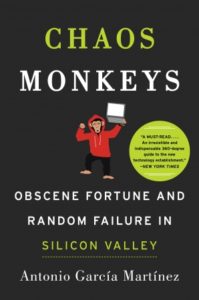 Let’s face it, we are all, every one of us, irrevocably married to this new and all-pervasive technology. We are computers and they are us. So isn’t it time that we learn something more about its source?
Let’s face it, we are all, every one of us, irrevocably married to this new and all-pervasive technology. We are computers and they are us. So isn’t it time that we learn something more about its source?
Antonio Garcia Martinez takes us on a four-year, inside-tour of Silicon Valley and San Francisco, an autobiography of life in the Valley: long-winded, discursive, sarcastic, cynical, opinionated, and always hilarious.
Martinez, an admitted “gleeful contrarian,” presents fascinating characters with enormous egos, from Zuck (Mark Zuckerberg), Sheryl (Sandberg), and Gokul (Gokul Rajaram); from start-ups to abrupt shutdowns; along with the organizations that shaped his life: University of California-Berkeley, Goldman Sachs, AdCharm, AdGrok, Facebook, Twitter, and, at last, Ayala, a cutter at anchor at Orcas Island in Puget Sound, prior to her escape into the Pacific Ocean. And people as well — since he is also a human being — including several female partners and two young children.
So exactly what is this “Valley?”
“It’s a society,” the author explains, “in which all men and women live in their own self-contained bubble, unattached to traditional anchors like family or religion, and largely unperturbed by outside social forces like income inequality or the Syrian Civil War.
‘Take it light, man’ elevated to life philosophy. Ultimately, the Valley attitude is an empowered anomie turbo-charged by selfishness, respecting some nominal ‘feel-good’ principals of progress or collective technological striving, but in truth pursuing a continual self-development refracted through the capitalist prism: hippies with a capitalization table and a vesting schedule.”
Wow!
His characters display both greed and credibility: they “ … spend their lives in a blizzard of meetings interspersed with email breaks.”
And what are the “chaos monkeys” of his title? They are the “software tools to test a product or a website’s resilience against random serve failures.” Beware the system!
Yet Martinez sees this mélange as being composed of human beings after all, noting, “The tech start-up scene for all its pretensions of transparency, principled innovation, and a counter-culture renouncement of pressed shirts and staid social convention, is actually a surprisingly reactionary crowd.” It is one “wired on caffeine, fear, and greed at all times.” And Facebook, Twitter, and Google have become “all-consuming new” religions. Technology is the Soma of our time.
Despite this cynicism, Martinez cannot help but admire Mark Zuckerberg: “I submit he was an old-school genius, the fiery force of nature possessed by a tutelary spirit of seemingly supernatural provenance that fuels and guides him, intoxicates his circle, and compels his retinue to be great as well … The keeper of a messianic vision that, though mercurial and stinting on specifics, presents an overwhelming and all-consuming picture of a new and different world … the church of a new religion.”
The author suggests we consider similar leaders in history: Jefferson, Napoleon, Alexander, Joseph Smith, Jim Jones, and L. Ron Hubbard. The leaders and followers in the Valley are simply part of that natural human urge to believe and to be part of something bigger than oneself.
But the Martinez story doesn’t fade into a glowing future. Following Robert Frost’s admonition, the author in early 2016 concludes “a man occasionally reaches a fork in life’s road.”
His last sentence predicts a completely different future: “Thus do I bow off this stumbled-upon stage, hopefully forever, and disappear into the heaving swells of the Pacific Ocean, the only such sanctuary from social mediation we’ll soon have left.”
Sail on, skipper! I give you joy of your decision.
Editor’s Note: ‘Chaos Monkeys: Obscene Fortune and Random Failure in Silicon Valley’ by Antonio Garcia Martinez, is published by HarperCollins, New York 2016.

About the Author: Felix Kloman is a sailor, rower, husband, father, grandfather, retired management consultant and, above all, a curious reader and writer. He’s explored how we as human beings and organizations respond to ever-present uncertainty in two books, ‘Mumpsimus Revisited’ (2005) and ‘The Fantods of Risk’ (2008). A 20-year resident of Lyme, he now writes book reviews, mostly of non-fiction that explores our minds, our behavior, our politics and our history. But he does throw in a novel here and there. For more than 50 years, he’s put together the 17 syllables that comprise haiku, the traditional Japanese poetry, and now serves as the self-appointed “poet laureate” of Ashlawn Farms Coffee, where he may be seen on Friday mornings. His wife, Ann, is also a writer, but of mystery novels, all of which begin in a bubbling village in midcoast Maine, strangely reminiscent of the town she and her husband visit every summer.